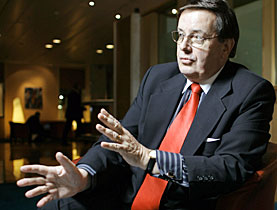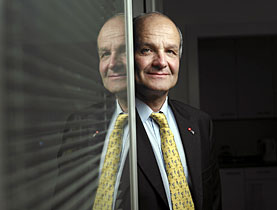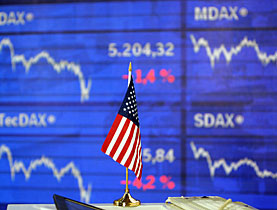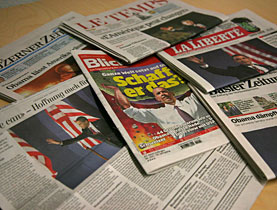“Europe is no longer centre of US attention”

As Barack Obama wraps up his first trip to Europe as president, Switzerland's former ambassador to the United States talks to swissinfo about the fragile relationship.
Alfred Defago, whose latest book “The United States, Barack Obama and the American Dream” is set to be published in German in May, also explains Switzerland’s role in the new world order.
In the collection of essays, Defago, professor of international relations at the University of Wisconsin, explains the opportunities for Obama as well as the potential dangers and looks at which new relationships – and new misunderstandings – could develop.
Defago was ambassador to the US in the late 1990s, when relations were strained by the dormant Holocaust-era accounts affair.
swissinfo: Why did you write this book?
Alfred Defago: I still see a lot of transatlantic misunderstandings. With the Obama era Europeans are more open to the US all of a sudden – they think Obama can change almost everything – and there’s sometimes a very uncritical admiration for him and an overly optimistic picture of America.
Paradoxically I sometimes have the impression that the Obama cult is the flip side of the hatred of Bush and the other America, but in both cases Europeans are far from having a realistic and balanced view of the US.
swissinfo: Are there plans to translate it from German?
A.D.: No. This is a book that makes sense only to a European audience. For Americans I’d have to write a totally different book in which I explain what Americans consider the occasionally awkward attitude of some Europeans!
swissinfo: Obama’s approval ratings are still high, but he has recently experienced a difficult few weeks. What are his biggest challenges?
A.D.: Definitely the promises he made during his campaign – he was the candidate of hope and promises. He generated a lot of high expectations and now of course he has problems meeting them.
We’ll see. There’s still hope around, you can feel it the whole time. But that can’t go on for ever. I think he’ll have some time where people remain patient, but if there isn’t anything that can be perceived as a turnaround – economically but also spiritually and intellectually – by early winter, it could become a real problem for him. People will look for other solutions. There are mid-term elections in November 2010 and that could be a Democrat Waterloo.
swissinfo: The Founding Fathers defined the American Dream as “life, liberty and the pursuit of happiness”. Is that still an accurate definition?
A.D.: It remains, as all dreams do, vague, but it’s a dream of opportunity for everyone who wants to achieve material prosperity. But it can also mean some spiritual things, and I think the vagueness of this term is probably its weakness but at the same time its power.
[The concept] has always been controversial in the US because for many people the dream is unachievable and many people have been disappointed again and again, but it’s still alive and the fact that Obama became president definitely helped rejuvenate the American Dream.
swissinfo: You also address foreign policy. To what extent could the book also be called the Global Dream?
A.D.: I focus on European-US relations and I refer to the fact that the American Dream is to a certain extent unique to the United States. Europeans are probably battered by history and so have a more down-to-earth – sometimes even cynical or sarcastic – approach to dreams in politics. I think they are fascinated with Obama’s career because it couldn’t happen in most European countries.
[The United States] is still a fundamentally optimistic nation: people think they really can make the turnaround and everything will be good again in two or three years.
swissinfo: Are you optimistic?
A.D.: I’m slightly sceptical about Obama’s economic plans. He’s maybe too comprehensive in his efforts to resolve problems.
Looking at how Europeans react to his enormous stimulus package, you see the old tensions once again. For example [on March 26] the Czech prime minister Mirek Topolanek said American remedies for the global recession were “the road to hell”.
swissinfo: Inferno aside, how do you see relations between Europe and the US?
A.D.: I predicted that relations would get better, but of course that’s not a big thing after Bush. Relations will improve but some old conflicts will remain. One of which is definitely the fact that Europeans can see that Europe is no longer the centre of American attention.
It was no coincidence that Obama’s first contact with foreign countries was in Asia and the Middle East. [Secretary of State] Hillary Clinton’s first visit abroad was in East Asia. She visited Europe as well, but it’s clear that America has a more Pacific view on global issues. Europe shouldn’t be surprised if it plays second fiddle at best.
swissinfo: Swiss-US relations are rather tense at the moment. Are you surprised at how aggressively the US government is targeting Swiss banking secrecy?
A.D.: Not really. I predicted in January, before Obama took over, that the situation would become unpleasant for Switzerland if the US and Europe coordinated their efforts to go after Swiss banking secrecy.
That is what happened – not because the Americans pressed the issue on their own, but because Switzerland was confronted by a very unholy coalition of countries that wanted to abolish banking secrecy as a key element of Swiss international economic relations.
swissinfo: How is Switzerland seen in the US?
A.D.: Overall relations are very good, but Americans have this view of politics where they compartmentalise relations: they can say “our relationship is in ten boxes and in eight of them things are excellent, in the ninth they are good and in the tenth – banking secrecy – we have serious problems that have to be resolved”.
But the Swiss tend to see relations in a very comprehensive way and if something is not in order they think the whole relationship is a shambles.
We Swiss should learn to see a relationship as a container of many boxes and try to resolve problems boxwise.
swissinfo-interview: Thomas Stephens
The United States is Switzerland’s main trading partner outside Europe.
Swiss exports reached SFr18.32 billion ($16 billion) in 2007, while US imports totalled SFr9.43 billion.
The US is the main destination for direct Swiss investments.
The two countries in 2006 set up the Swiss-US Trade and Investment Cooperation Forum.
In 2007 the Swiss expat community in the United States totalled 73,978 people.
Alfred Defago was born in Chur, eastern Switzerland, in 1942. He received a PhD in history and German literature from Bern University. Since 2001 he has been professor of international relations at the University of Wisconsin.
He was Ambassador of Switzerland to the US from 1997-2001 and Consul General of Switzerland in New York from 1994-1997. He was Secretary-General of the Swiss foreign ministry from 1993-1994.
Defago was director of the Federal Culture Office from 1986-1993.
His public service career began in 1971 when he joined the Swiss Broadcasting Corporation (SBC), swissinfo’s parent company. He was editor-in-chief of the national radio service of the SBC from 1984-1986.
He has also studied at the University of Vienna, the German Institute in Rome and the Vatican Library and spent a sabbatical year in Berkeley, California, in 1983.
His latest book, “The United States, Barack Obama and the American Dream”, asks: where is the US going under Obama? Can Obama lead his country out of the current crisis? Can he fulfil the massive expectations? How will Obama’s policies affect Europe?

In compliance with the JTI standards
More: SWI swissinfo.ch certified by the Journalism Trust Initiative





You can find an overview of ongoing debates with our journalists here. Please join us!
If you want to start a conversation about a topic raised in this article or want to report factual errors, email us at english@swissinfo.ch.